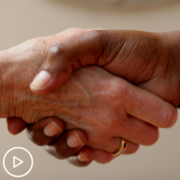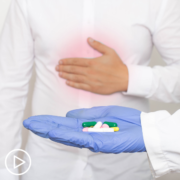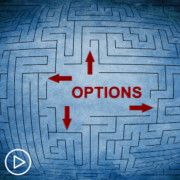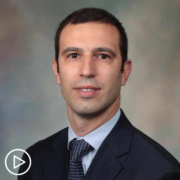Trustworthy Resources to Help You Learn More About Lung Cancer
Trustworthy Resources to Help You Learn More About Lung Cancer from Patient Empowerment Network on Vimeo.
Expert Dr. Martin Edelman shares credible resources to help lung cancer patients become informed and empowered.
Dr. Martin J. Edelman is Chair of the Department of Hematology/Oncology and Deputy Director for Clinical Research at Fox Chase Cancer Center. More about this expert here.
View more from Fact or Fiction? Lung Cancer
Related Programs:

Lung Cancer Treatment Decisions: Which Path is Best for You? |

Lung Cancer Symptoms, Side Effects & Treatment Resource Guide |

|
Transcript:
Patricia:
Let’s talk a little bit about health literacy. What would you suggest patients use for online resources? What are good resources?
Dr. Edelman:
So, there are some excellent resources. The International Association for the Study of Lung Cancer has resources for patients. The National Coalition of Comprehensive Cancer Center Network (NCCN) has resources. American Society of Clinical Oncology has resources. So, those or American Cancer Society. So, there are some really reliable sources out there. And there’s a great deal that’s very unreliable – people’s Facebook pages. I’ve seen this.
Patricia:
It’s a big place.
Dr. Edelman:
Everybody always – and I think it’s important for people to understand. There will be people who will get something and have a fantastic response. I’ve used anecdotes.
The anecdotes I’ve used are to illustrate the potential hope of benefit. They’re not exceptions to the rule anymore. They’re the good case scenarios. I could have just as many anecdotes of people who didn’t benefit and stuff. And I think it is important going into this – and that’s why we are reassessing patients constantly and getting repeat scans because we don’t necessarily know always – even if something’s 90 percent effective, it means 10 percent of the time it’s not.
And each patient – we’re getting better at individualizing and personalizing therapy, but we’re not perfect yet. And we probably never will be. So, there will always be anecdotes. I think what’s – as a friend of mine puts it – the plural of anecdotes is not data. When I say, “Well, chemoimmunotherapy works.” It’s not because I have anecdotes of that, though anecdotes illustrate the magnitude of benefit.
I have data that shows that the chemoimmunotherapy regimen was compared to chemotherapy and was clearly and unequivocally superior. When I give a statistic that 60 percent of patients, 65 percent, can benefit from those types of regimens. That’s based upon prospective randomized control trials.










